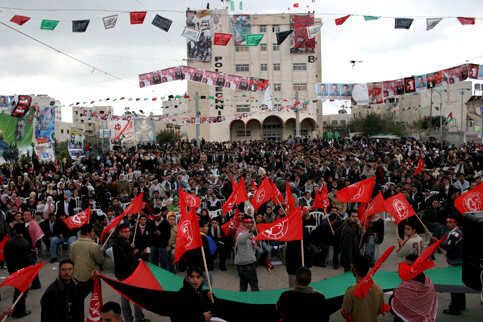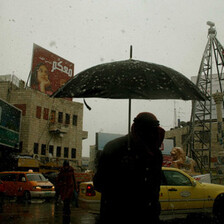6 April 2007

Palestinian student supporters of the PFLP movement during a student council elections rally at Polytechnic University in the West Bank city of Hebron, 18 March 2007. (Mamoun Wazwaz/MaanImages)
My students are robots that come in different colors: green, white, and red. Each is representative of a political party: Hamas, Fatah, and the Popular Front, respectively.
Birzeit University’s campus has been overly crowded for the last few days. Eyes from both on and off campus are on the Student Council Elections, which some believe will gauge the outcome of potential early parliamentary elections.
Only eight students — two were guests — showed up to Wednesday’s class. The other ten not showing up is the norm; out of their moral and/or partisan obligations most students skip classes — lessons can wait but elections cannot. So we chose to discuss politics rather than English.
Three women students quietly sat in front wearing the green slogans of the Islamic Bloc, Hamas. They all looked and behaved alike. Three other women students wearing the checkered kuffiyeh, signifying Fatah allegiance, sat apart and kept quiet for the first few minutes. One of the men students sitting right in the middle said he already voted for the Islamic Bloc, and the other confessed he was still confused between the latter and the Democratic Front. I lost control over the class and just sat down, paying full attention to their arguments, smiling, and sometimes intervening in pathetic attempt to give the voiceless a chance to speak up. My attempts were mostly fruitless. Firas, the confused guy, dominated the debate. He did not adopt any of the partisan slogans; he is Jerusalemite and was probably worried about showing political affiliation, or so I understood from his tone.
The eight discussed religion and politics at large and pointed fingers at one another. Some praised his or her party’s accomplishments over the years and attributed the economic and social failure on the others. When I asked them what they thought of the previous day’s public debate in which all the parties under the auspices of Birzet University’s staff participated, they expressed either personal admiration or mockery of the setting or speakers. And just like the parties’ representatives in that debate, none of them seemed to pay attention to the questions asked. Thinking that maybe I should bring those issues into discussion once again, I could make them think of the theoretical role of the Student Council and the duties and services it should extend to Birzeit students.
But everyone was too busy condemning Hamas’ betrayal of its supporters symbolized in their implied recognition of Israel, or Fatah’s increasing wealth and corruption, and most importantly the bloody internal fighting and mutual abductions in Gaza.
I eventually rose up and closed the door to contain their increasing clamor. Unbelievable! They are all blind to the purpose of such a council. But disrespect, yelling, pointing fingers, and blindness have all become indispensable characteristics of us Palestinians.
They are all in dire need of financial help and counseling services, but none of them thought that this is why this council exists, and that they should elect the suitable individual, rather than the political party, that is willing to support them in their academic pursuits. The aforementioned “students’ ” parties have spent tens of thousands of dollars on the electoral campaign — flags, posters, and banners that colored every single spot on campus. The estimated costs are believed to have otherwise financed dozens of deprived Palestinian students’ tuition.
Awareness is a key notion that our students lack. They are brainwashed with partisan mantras and slogans, and sadly they are unwilling to hear out the other at all or even accept the others’ right to believe differently.
Dana Shalash’s blog is Stranger than Fiction.



